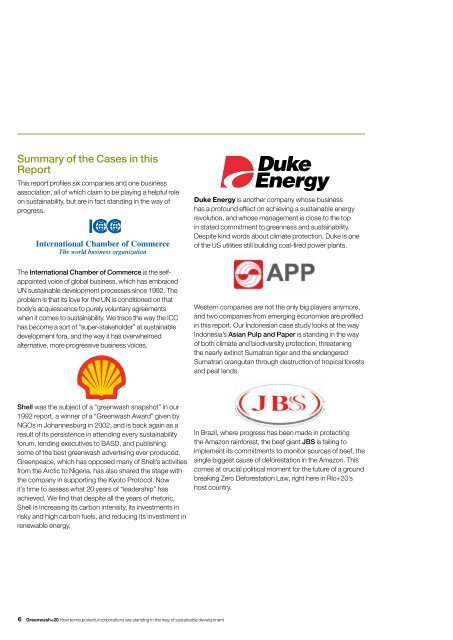Greenwash+20 - Greenpeace
Greenwash+20 - Greenpeace
Greenwash+20 - Greenpeace
You also want an ePaper? Increase the reach of your titles
YUMPU automatically turns print PDFs into web optimized ePapers that Google loves.
Summary of the Cases in this<br />
Report<br />
This report profiles six companies and one business<br />
association, all of which claim to be playing a helpful role<br />
on sustainability, but are in fact standing in the way of<br />
progress.<br />
Duke Energy is another company whose business<br />
has a profound effect on achieving a sustainable energy<br />
revolution, and whose management is close to the top<br />
in stated commitment to greenness and sustainability.<br />
Despite kind words about climate protection, Duke is one<br />
of the US utilities still building coal-fired power plants.<br />
The International Chamber of Commerce is the selfappointed<br />
voice of global business, which has embraced<br />
UN sustainable development processes since 1992. The<br />
problem is that its love for the UN is conditioned on that<br />
body’s acquiescence to purely voluntary agreements<br />
when it comes to sustainability. We trace the way the ICC<br />
has become a sort of “super-stakeholder” at sustainable<br />
development fora, and the way it has overwhelmed<br />
alternative, more progressive business voices.<br />
Western companies are not the only big players anymore,<br />
and two companies from emerging economies are profiled<br />
in this report. Our Indonesian case study looks at the way<br />
Indonesia’s Asian Pulp and Paper is standing in the way<br />
of both climate and biodiversity protection, threatening<br />
the nearly extinct Sumatran tiger and the endangered<br />
Sumatran orangutan through destruction of tropical forests<br />
and peat lands.<br />
Shell was the subject of a “greenwash snapshot” in our<br />
1992 report, a winner of a “Greenwash Award” given by<br />
NGOs in Johannesburg in 2002, and is back again as a<br />
result of its persistence in attending every sustainability<br />
forum, lending executives to BASD, and publishing<br />
some of the best greenwash advertising ever produced.<br />
<strong>Greenpeace</strong>, which has opposed many of Shell’s activities<br />
from the Arctic to Nigeria, has also shared the stage with<br />
the company in supporting the Kyoto Protocol. Now<br />
it’s time to assess what 20 years of “leadership” has<br />
achieved. We find that despite all the years of rhetoric,<br />
Shell is increasing its carbon intensity, its investments in<br />
risky and high carbon fuels, and reducing its investment in<br />
renewable energy.<br />
In Brazil, where progress has been made in protecting<br />
the Amazon rainforest, the beef giant JBS is failing to<br />
implement its commitments to monitor sources of beef, the<br />
single biggest cause of deforestation in the Amazon. This<br />
comes at crucial political moment for the future of a ground<br />
breaking Zero Deforestation Law, right here in Rio+20’s<br />
host country.<br />
6 <strong>Greenwash+20</strong> How some powerful corporations are standing in the way of sustainable development

















